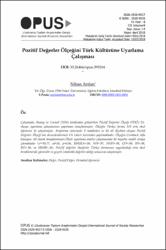Pozitif Değerler Ölçeğini Türk Kültürüne Uyarlama Çalışması
Citation
ARSLAN, Nihan. "Pozitif Değerler Ölçeğini Türk Kültürüne Uyarlama Çalışması". Uluslararası Toplum Araştırmaları Dergisi, 8.14 (2018): 240-252.Abstract
Çalışmada, Huang ve Cornell (2016) tarafından geliştirilen Pozitif Değerler Ölçeği (PDÖ) Tü-rkçeye uyarlama çalışmasının yapılması amaçlanmıştır. Ölçeğin Türkçe formu 315 orta okul öğrencisi ile çalışılmıştır. Araştırma sürecinde; 9 maddeden ve iki alt ölçekten oluşan Pozitif Değerler Ölçeği’nin derecelendirmesi 6’lı Likert üzerinden yapılmaktadır. Ölçeğin Cronbach Alfa katsayısı .88 olarak hesaplanmıştır.Ölçek uyarlama analizi çalışmasında iki boyutlu model ortaya çıkmaktadır (x²=58.77, sd=26, p=0.06, RMSEA=.06, NFI=.97, NNFI=.98, CFI=.98, IFI=.98, RFI=.96, ve SRMR=.36). Pozitif değerler ölçeğinin Türkçe formunun uygulandığı orta okul örnekleminde güvenilir ve geçerli istatistiki değerler aldığı sonucuna ulaşılmıştır. In this study, it was aimed to make adaptation of the Positive Values Scale (PDU) developed by Huang and Cornell (2016) to Turkish culture. The Turkish form of the scale was studied with 315 middle school students. In the research process, the rating of the scale of Positive Values consisting of 9 items and two sub-scales is made on the 6th response options. The Cronbach alpha coefficient of the scale was calculated as .88. A two-dimensional model emerges in the analysis of scale adapta-tion (x²=58.77, sd=26, p=0.06, RMSEA=.06, NFI=.97, NNFI=.98, CFI=.98, IFI=.98, RFI=.96, ve SRMR=.36. )It was concluded that the Turkish form of the positive values scale obtained reliable and valid statistical values in the middle school sample.



















